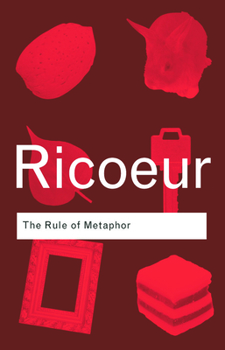The Rule of Metaphor: The Creation of Meaning in Language
Select Format
Select Condition 
Book Overview
A fruitful and insightful study of how language affects how we understand the world, this book is also an indispensable work for all those seeking to retrieve some kind of meaning in uncertain times.
Format:Paperback
Language:English
ISBN:0415312809
ISBN13:9780415312806
Release Date:August 2003
Publisher:Routledge
Length:464 Pages
Weight:0.85 lbs.
Dimensions:0.9" x 5.1" x 7.8"
Customer Reviews
2 ratings
For the Student of Geneologies
Published by Thriftbooks.com User , 19 years ago
Ricoeur's Rule of Metaphor is the missing link for anyone truly interested in getting at the roots of semiotics, semantics and hermeneutics. For the student of Western Civilization's grammar and logical structure, it provides a genesis of postmodern critique.
Metaphor is the message
Published by Thriftbooks.com User , 22 years ago
The problem is not that fiction shows itself to be a necessity for speculation (Ricoeur admits that it does) but that the distinctiveness between the fictions of art and the fictions of discourse/philosophy has been muddied by the exhaustion of both sets of metaphors. In other words, had we a language full of vital and living metaphors, we would then more easily recognize the distinctiveness of poetic and philosophic metaphor. He shows how Heidegger both acknowledges the distinction and then, in his attempts to step forward, slides down into the muddy waters where the distinction is lost. As a consequence, the later Heidegger shows the way only by his effort, not by his accomplishment.Ricoeur published this in 1971. He uses Anglo-American philosophy of language extensively. I particularly enjoyed his ability to blend work in aesthetics beginning with Aristotle's Poetics down to some living philosophers who I did not know had published in that area. For instance, he locates in Nelson Goodman's reliance on "expression" in art (what we'd usually call 'style') a transcendent dimension (a 'more' than the sum of the elements in a work of art) as parallel with what in discourse might be called intention (I forget the exact word he used). But again, discourse then has its version of a transcendent dimension that communicates as the sense of the whole -- if a thinker manages to pull that off.What was new to me (in addition to the recent scholarship on classical sources he used) was his thought. My impulse is to compare him unfavorably with Heidegger, by belittling Ricoeur's academic philosophy to Heidegger's existential declaration of the human condition. But he's just as good, in his own way. And while I could complain about his predisposition to work from within the respectable tradition of our western Judeo-Christian civilization (hence he remains 'God's' spokesman), he does not denigrate but uses the outstanding accomplishments of those for whom that tradition has become alien.





